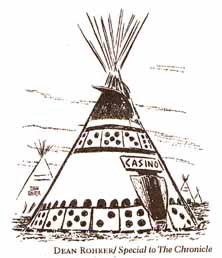 Another Stereotype of the Month entry:
Another Stereotype of the Month entry:
 Another Stereotype of the Month entry:
Another Stereotype of the Month entry:
Quechan casino project faces new hurdle
BY JOYCE LOBECK, Sun Business Editor
Sep 24, 2005
There won't be a groundbreaking this fall as hoped for a new casino and resort complex the Quechan Tribe intends to develop.
Instead of celebrating the project becoming a realty, Quechan President Mike Jackson faces yet another obstacle — one caused by an unexpected source.
Opposition from other California tribes has resulted in a delay of the project that will cost the Quechan Tribe millions of dollars and, more importantly, hundreds of jobs, Jackson said Friday.
Plans for the proposed project off Interstate 8 at the Algodones/Andrade exit include a 30,000-square-foot, two-story casino; six-story, 200-room hotel; restaurant; 32,000-square-foot special events center; truck stop; and other features.
The California Legislature adjourned earlier this month without acting on a measure to approve the new gaming compact the Quechans negotiated with Gov. Arnold Schwarzenegger to operate the proposed new casino. They also failed to act on a gaming compact for the Yurok Tribe in Northern California.
According to a report in the San Diego Union-Tribune, legislative approval of the compact was stalled by opposition from big gaming tribes such as Pechanga of Temecula and Agua Caliente of Palm Springs, contending that the new compacts have concessions and tighter regulations that the state might eventually try to impose on them.
"We were told before it went to the Legislature that there was no opposition there," Jackson said, "except for some opposition from the urban tribes. At the time, we didn't understand the nature of their influence with key legislators."
He was to learn those tribes were large contributors to members of the house and senate Government Operating committees, which review gaming compacts before they go to the floor of each body of the Legislature.
"They never got out of committee," Jackson said of the Quechan and Yurok compacts. "We felt we did everything correctly, but we were dealt with unfairly by the Legislature."
What really has him angry is the interference by the other tribes.
"No other tribe has any business butting into our business," he said, explaining that each American Indian tribe is a sovereign nation. "This has never happened before."
And he intends to fight back.
"I won't let another tribe dictate our future to us," Jackson said. "These rich, greedy tribes ... we'll definitely fight back."
The new casino and resort is important to the economic future of the Quechans, he said, with the revenue needed to fund such projects as a new education complex, senior nutrition center, vocational training program, tribal library and more homes for tribal members.
It also would provide more than 800 jobs.
"That doesn't sit well with me," Jackson said.
"We're looking at legal options," said attorney Larry Stidham.
After meeting with the Quechan Tribal Council, the first step likely will be to request dispute resolution with the state, he said. If that fails, the tribe probably will explore appealing to the federal court.
Stidham said he believes the tribe could accept the terms of other gaming compacts, such as one with the Fort Mojave Tribe, that have already become law and that would allow more slot machines.
The compact negotiated with Schwarzenegger would have allowed the Quechans to build a new casino with up to 1,100 slot machines. The tribe currently operates a casino with 475 slot machines on the Arizona side of the reservation and a 347-slot casino nearby that is in California.
Whatever the options pursued and their outcome, Jackson said the tribe has lost two years of revenue from the proposed development. And while the construction is on hold, costs continue to go up.
The delay throws off the timing of the construction, Stidham said. Even if the tribe gets a new compact by spring, it would be the fall of 2006 before construction could start because of the summer heat.
This will impact not only the tribe, Jackson said, but also will hurt construction suppliers and potential vendors in Yuma and delay jobs for Yumans as well as tribal members.
© Copyright, YumaSun.com
Rob's reply
Note the disconnect between the "big tribes'" explanation for opposing the Quechan compact:
According to a report in the San Diego Union-Tribune, legislative approval of the compact was stalled by opposition from big gaming tribes such as Pechanga of Temecula and Agua Caliente of Palm Springs, contending that the new compacts have concessions and tighter regulations that the state might eventually try to impose on them.
and Jackson's characterization of those tribes:
"I won't let another tribe dictate our future to us," Jackson said. "These rich, greedy tribes ... we'll definitely fight back."
Judging by his comments, Jackson has no justification for claiming the "big tribes" are greedy. He's stereotyping them just like non-Indian gaming foes do.
For related analyses, see Press Enterprise: Casino Tribes Blocked Gaming Compacts and Schwarzenegger: "[T]he Big Tribes...Control the Legislators".
Related links
Rich Indians
Greedy Indians
Too-powerful Indians
|
. . . |

|
All material © copyright its original owners, except where noted.
Original text and pictures © copyright 2007 by Robert Schmidt.
Copyrighted material is posted under the Fair Use provision of the Copyright Act,
which allows copying for nonprofit educational uses including criticism and commentary.
Comments sent to the publisher become the property of Blue Corn Comics
and may be used in other postings without permission.